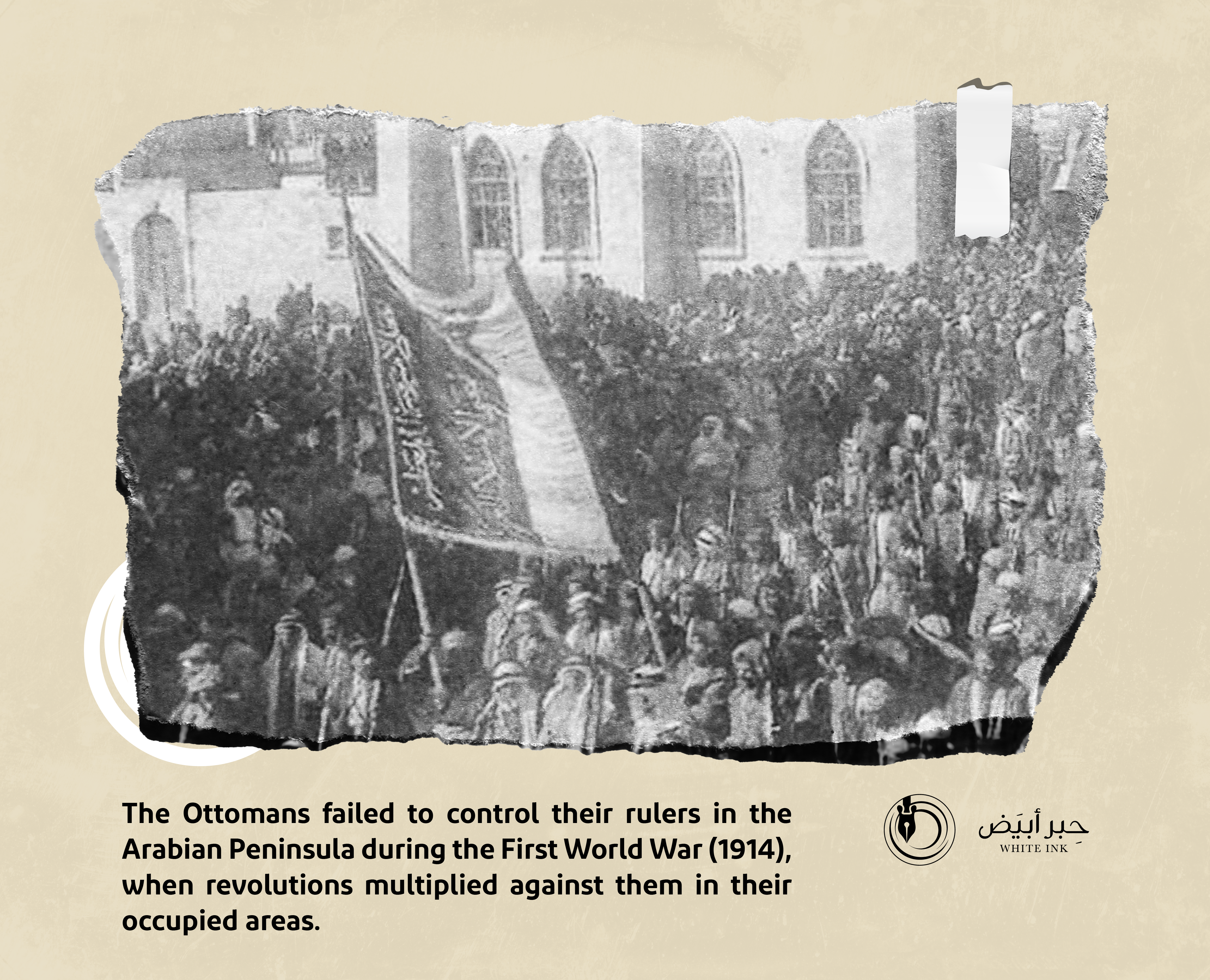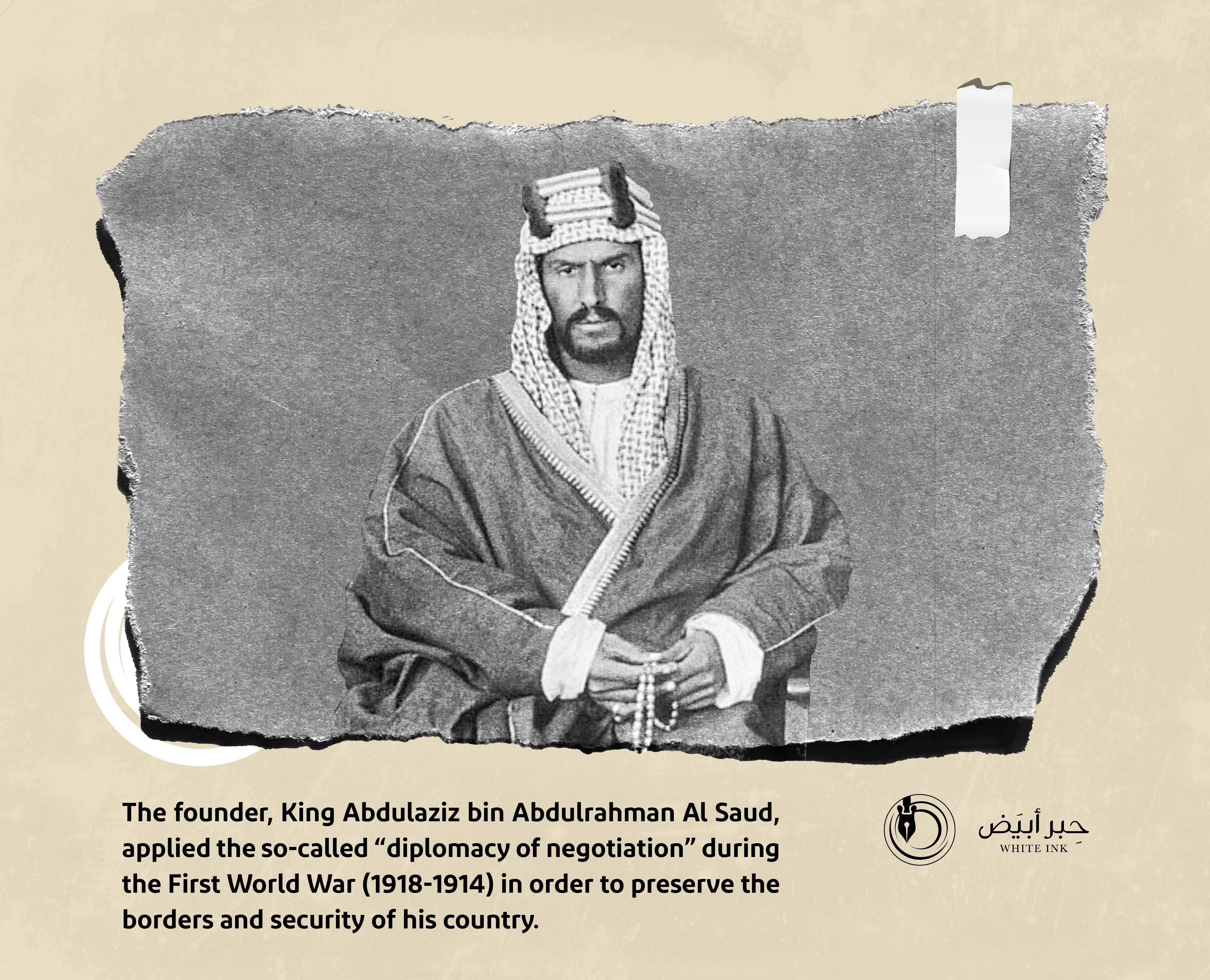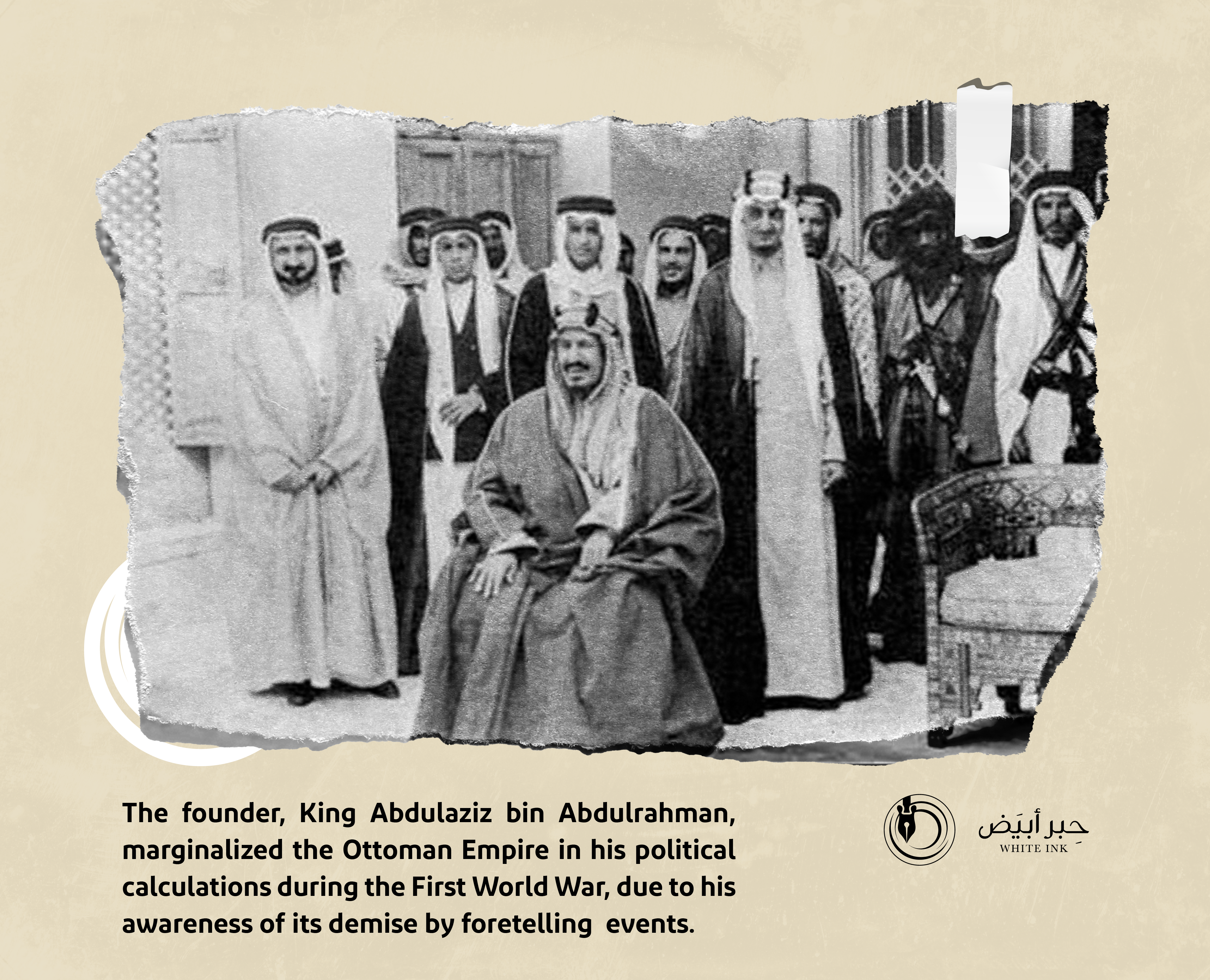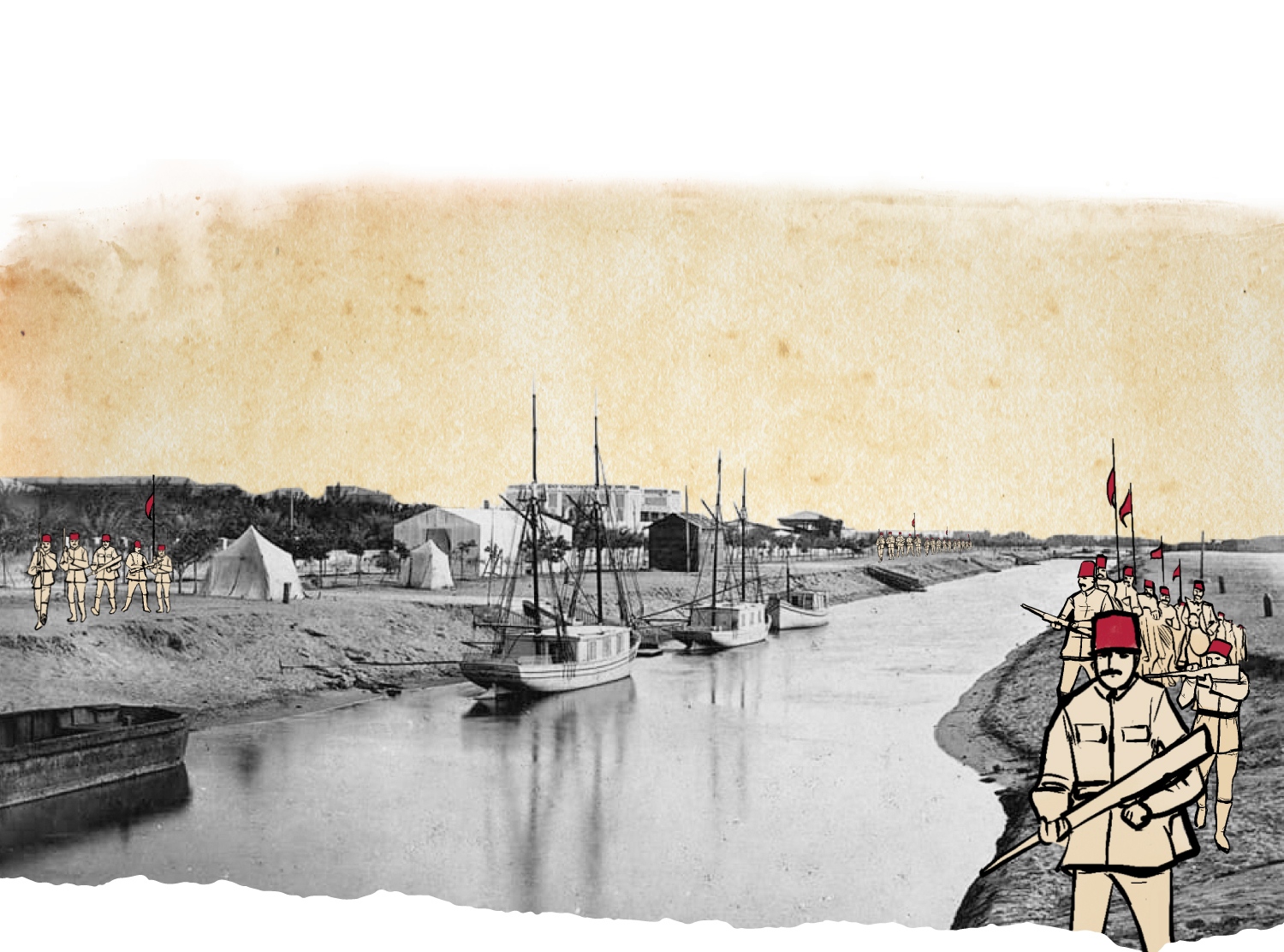
The history of their Turkish state confirms their deception and brutality
King Abdulaziz realized the Ottoman political deception attempts very early
The tension of world events increased in the summer of (1914) after the world experienced a great war for the first time, taking place in the continents of the ancient world, later called “First World War”. This war emphasized the geopolitical importance of the Middle East, a region that played an important role during this war.
In light of these successive events, the founder, King Abdulaziz bin Abdulrahman Al Saud, found himself in a position where he needed to use political wisdom, especially with regard to the balance between the conflicting global powers in the nearby regions in the Middle East.
Although the Ottoman Empire tried to win the trust of King Abdulaziz to be close to it in the balances of war, the founder was well aware that the Ottomans would hurry to break any promises or commitments if these promises and commitments affected their interests. In practice, King Abdulaziz’s vision of the Ottomans was true. Despite the state’s attempts to get close to him, it was providing assistance and support to his opponents directly and covertly against him.
The Ottomans aspired from this contradictory policy with King Abdulaziz to stop the unification of the Saudi homeland, as they did in the era of the first and second Saudi states. They were also in a crisis because of their distance from the Arabian Gulf after their expulsion from Al-Ahsa and the hostility of the growing local powers in it. The Arabian Gulf was a vital region, especially during the First World War. In western Arabia, the Ottoman Empire was seeking to ensure the survival of strong relations with the Sharif of Mecca in order to preserve the false religious propaganda that it promoted in the Islamic world. In addition, they promised the governor of Mecca to preserve the Hejaz Railway, which the Ottoman Empire viewed not only as an important means of transporting pilgrims from the Islamic world, but also a vital means for transporting Ottoman soldiers and supplies to the Arabian Peninsula to support their rickety powers and weak Ottoman influence in the region.
The situation in the region became more critical with the beginnings of the Ottoman campaign on the Suez Canal. This campaign came out of the Levant and crossed the Sinai to control the Suez Canal in order to cut the most important lines of Britain that linked it to its most important colony, India.
During that time, the Arabian Peninsula was suffering from a severe economic crisis as a result of the blocking of trade routes and their difficulty due to the circumstances of the world war. The political powers found themselves facing strong political and economic challenges at the same time, which made the positions of some powers critical in that period that the whole world went through.
At that time, the Saudi state was suffering, like its neighbors, from an economic crisis, especially after its trade with the countries that were affiliated with the Ottoman Empire was cut off greatly. Therefore, King Abdulaziz worked to find solutions to overcome the crisis.
Although the international powers tried to persuade the local powers to ally themselves with them during the war in return for providing assistance, the founder King Abdulaziz preferred to take a neutral position on this general international pressure. This was due to his political cunning. On the other hand, he welcomed the treaties that allow him to impose his conditions in his political and economic relations in which he sees the interest of his land and country.
At the time when the Ottomans were making promises of alliance to the founder, they were supporting his opponents against him.

In 1915, discussions took place between the founder and Britain, which has a presence in the Arabian Gulf. This resulted in the Treaty of Darin, also known as the Treaty of Qatif. The most important clauses of that treaty were Britain’s recognition of Ibn Saud’s independence and his control over the provinces of Najd, Al-Ahsa, Qatif, Jubail, their affiliated areas, and their ports on the coast of the Arabian Gulf. Britain’s recognition is an international recognition in which the matter applies to the rest of the world’s countries, which proceeded after this date to conclude treaties with King Abdulaziz in later periods. The Egyptian historian Abdul Rahim Abdul Rahman mentions his view of that treaty, saying: “The treaty benefited Sultan Abdulaziz in his quest to get rid of the Ottoman Empire and it strengthened his international status”.


- Turkiah Jarallah, King Abdul Aziz’s Attitude towards the First World War (Master Thesis, Umm Al-Qura University, 2004).
- Hafez Wehba, The Arabian Peninsula in the Twentieth Century (Writing and Translation Committee, 1935).
- Khair Al-Din Al-Zarkali, The Arabian Peninsula in the Era of King Abdulaziz, 3rd Edition (Beirut: Dar Al-Ilm LilMalayin, 1985).
- Abdul Rahim Abdul Rahman, Modern and Contemporary History of the Arabs, 5th Edition (Cairo: University Book Centre, 1987).
- Abdullah Al-Othaimeen, History of the Kingdom of Saudi Arabia, 12th Edition (Riyadh: Al-Obeikan Library, 1995).
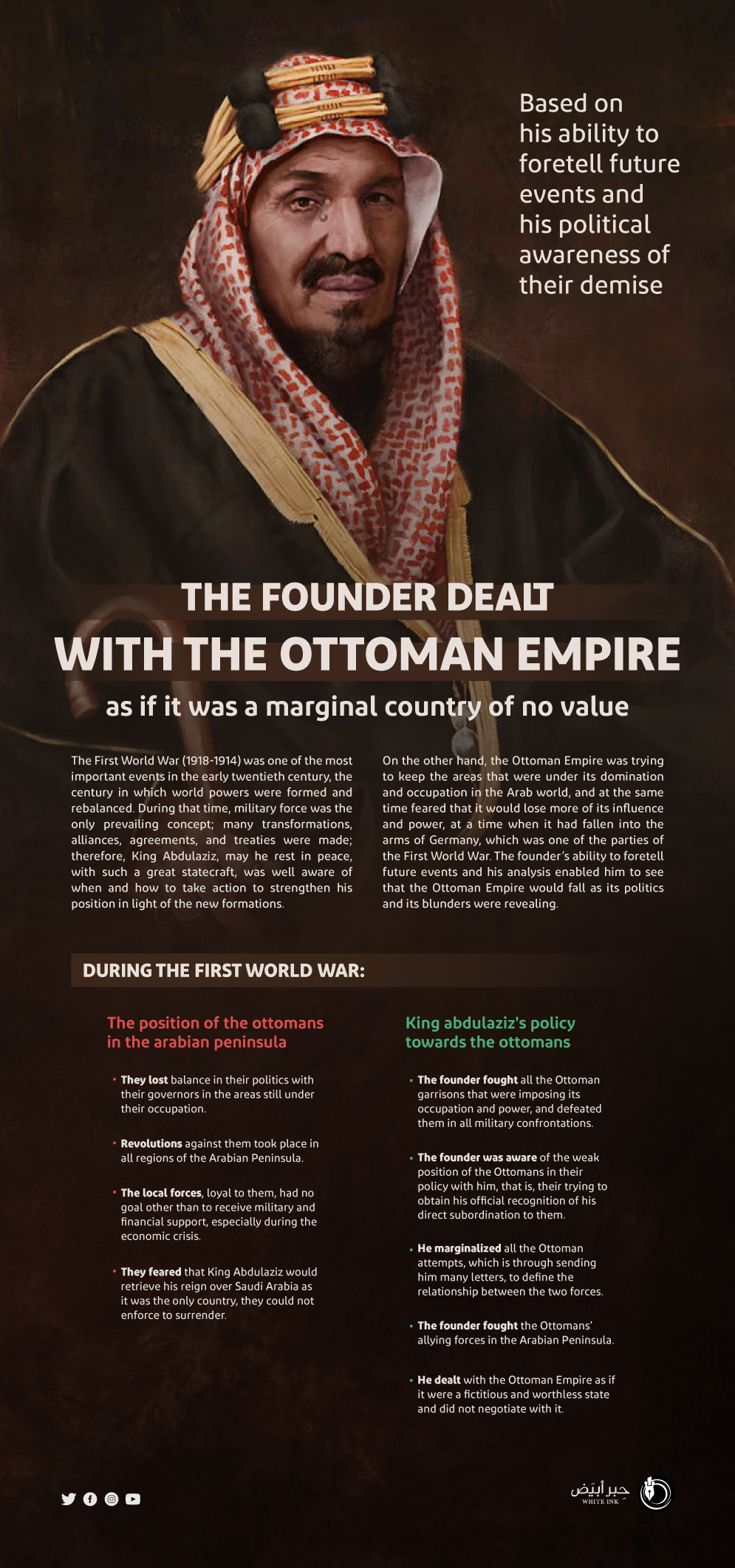
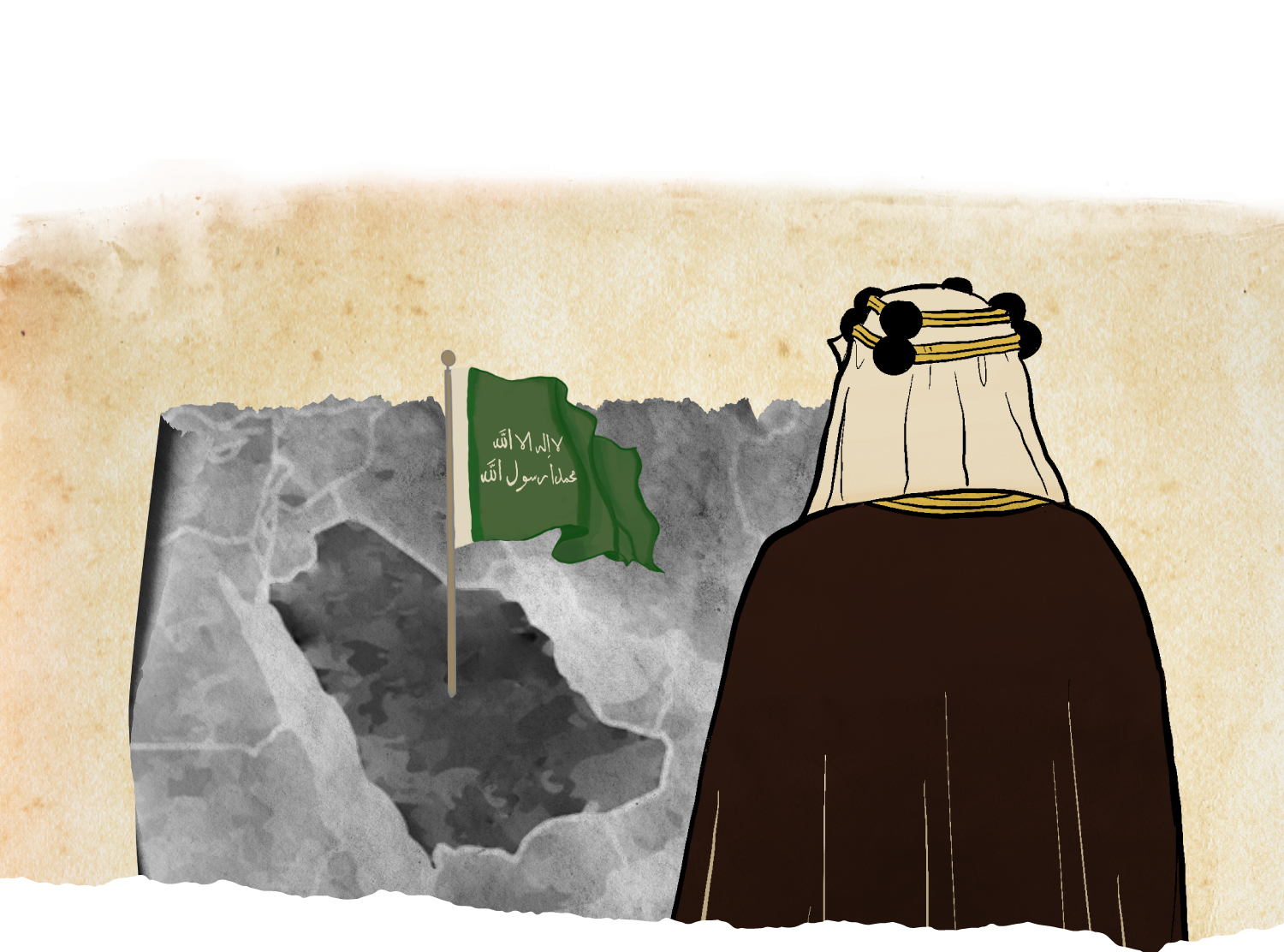
Despite the attempts of the Ottomans to impose a treaty in their favour
King Abdulaziz applied the so-called “Diplomacy of negotiation” during the First World War
The beginnings of the twentieth century constituted important shifts in the regional and international balances of power and brought back, once again, the logic of alignments according to interests, at times, and according to ideological loyalties, at other. The Arabian Peninsula was affected by the new international reality, especially since some of the parties of the World War were about to attack, and, hence, the danger of violent fight was looming over the theater of the Arabian Peninsula operations.
In this context, the First World War (1914-1918) coincided with King Abdulaziz, facing basic challenges that can be summarized in: confronting the compulsion of the struggle against Turkish subordination and then quelling the internal strife, before devoting himself to the goal of unification and stability. These are the challenges that the founding king was able to overcome, with great wisdom.
Perhaps the First World War, although one of its direct repercussions was the fall of the Ottoman Empire, yet King Abdulaziz took advantage of the new circumstance to be an accelerating factor in the consolidation and unification of the foundations of the state, making use of what was later called, in international relations literature, as “diplomacy of the negotiator”. It is the strategy, through which he will succeed in extracting, from Britain, an explicit recognition of his country as an independent country that is not affiliated with any other powers. This is the confession, included in the -later- signed Uqair Protocol (1915). It ensures that King Abdulaziz is to get certain political gains.
The Saudi-British relations infuriated the Turks, who were still suspicious of any approchement between King Abdulaziz and Britain. Therefore, in light of this geostrategic compulsion, they rushed to send a delegation headed by Talib Al-Naqib to make promises, that they never keep, which included their recognition of King Abdulaziz’s authority over the areas under the actual sovereignty of his state in return for declaring its subordination to them. But the outbreak of the First World War hastened it before the negotiations ended.
It is worth noting that the study of the behavioral structure of King Abdulaziz and the bave Saudi mentality makes it impossible for him to accept the conditions contained in the “Ottoman proposal”. The founder kept it with him, and did not sign it.
The outbreak of World War I made the Ottomans in dire need of King Abdulaziz. Perhaps what confirms this conclusion is his disapproval of aligning with them in the world war, preferring in return to the strategy of positive neutrality and playing on contradictions and exploiting them for the benefit of the new state.
In this regard, King Abdulaziz received a letter from Enver Pasha, requesting to send his forces to Syria to help the Ottoman government against Britain, but the founder replied with his regret that he was unable to do this due to local conditions. It seems that Britain found itself in a bad geostrategic position, especially when Sharif Hussein expressed the same position, and even declared a revolution against it, which made King Abdulaziz in a strong negotiating position with all parties.
King Abdulaziz’s manners could not have let accept but empowering his state, with its historical roots stretching back to 1744. Therefore, the wisdom of King Abdulaziz made him decide to avoid war alignments, and instead, work on continuing the stage of construction and unification, hence, avoiding wars and tragedies. The wisdom of the founding leader ended more than a century of violent clashes between Arabs and Turks, which was achieved by Turkey’s recognition of the Kingdom of Saudi Arabia by Atatürk in 1929.
The founder avoided war alignments during the First World War to continue the phase of construction and unification.



- Turkiah Al-Jarallah, King Abdulaziz’s position on the First World War (Master’s Thesis, Umm Al-Qura University, 2004).
- Hafez Wahba, The Arabian Peninsula in the Twentieth Century (d.d.: Committee for Composing and Translating, 1935).
- Khair Al-Din Al-Zarkali, The Peninsula in the Era of King Abdulaziz, 3rd Edition (Beirut: Dar Al-Ilm for Millions, 1985).
- Abdel Rahim Abdel Rahman, Modern and Contemporary History of the Arabs, 5th Edition (Cairo: Dar Al-Kitab Al-Jami, 1990).
- Abdullah Al-Othaymin, History of the Kingdom of Saudi Arabia (Riyadh: Al-Obaikan Library, 1997).

In order to preserve the gains achieved during the stage of national unification
The founder did not take sides during the First World War, despite the Ottomans continuous attempt to force him into it
After king Abdulaziz restored Al-Ahsa, and purged it from the Ottomans in (1913), he turned to deal with the new political reality in such a cunning way. In other words, he attempted to become king over all of the regions of Saudi Arabia, keep its borders safe, and expel the long-hated colonizer, so he signed agreements that should ensure the security of his country, cities, and ports.
Negotiations to settle the differences between the British and the Ottoman government over defining the borders between them had taken a long time, and had not reached satisfactory results for both parties. King Abdulaziz was aware that the coast of the Persian Gulf had his Arab emirates bound by treaties with Britain, and he was fully aware of the strength of that country, and the importance of securing his side of the land, that comes side- by- side with theirs, through balancing its relationship with it. To prove this, King Abdulaziz took it upon himself to the Ottomans. In one of his messages, he confirms this, “the Turkish shall leave this land in any way, and we, on our behalf, insist on their removal.” Despite his focus on uniting the rest of the Arabian Peninsula, especially the northern parts of Najd, King Abdulaziz revealed a clear strategy that aims at purging Saudi lands from the Ottoman influence.
King Abdulaziz was aware of the political situation, and realized that the Ottoman Empire is falling, and that the Great powers have got them. Therefore, he decided not to take any side during the First World War, instead, he focused on uniting the lands of the Saudi region. He did not care for any religious speeches used to get them to take the Ottomans’ side in the war as he was aware that this has always been the Ottomans way to mobilize.
On the other hand, Britain was important in global balances, especially since its protectorates in the Persian Gulf on the eastern borders of Saudi Arabia, and accordingly, it was necessary to sign a treaty between King Abdulaziz and Britain to rule the eastern borders in the first place. Hence, negotiations began between the two parties on this issue until the conclusion of signing of the Treaty of Darin on December 26, 1915. The treaty included, among its most important provisions, the British recognition of the independence of the borders of King Abdulaziz, which he reached during the treaty period, and also focused on maintaining secure borders with the lands of the Arab Gulf emirates, that were under British protection. The great gain from this treaty was the international recognition of the Saudi state, which was led by the founder, to become a major player in the balance of power in the region in the first place.
When Britain imposed its protection on the emirates of the Persian Gulf, King Abdulaziz signed with it “Treaty of Darinin” in order to preserve its borders and ports.

King Abdulaziz did not take sides during the First World War, so he completed his national project and preserved his lands with a careful policy. He stated in one of his letters: “Our treaties concluded with the British state have reached your presence. The purpose of which is the interests of both parties and due consideration to current rights, to prevent troublesome and violating matters for the citizens of both parties and to stabilize security.” His dream of security, safety, stability and good neighborhood with the Arab environment has become true. The Ottoman Empire became outside his political and future calculations, so King Abdulaziz rose to an important stage, a stage of building and establishing the great Saudi entity.


- Text of the Treaty of Darien in the British Archives (IOR/R/15/2/32, p325).
- Abdul Aziz Abdul Ghani Ibrahim, Princes and Raiders, the Story of Borders and Territorial Sovereignty in the Gulf Documentary Study, 2nd Edition (Beirut: Dar Al-Saqi, 1991).
- Abdullah Al-Othaymin, History of the Kingdom of Saudi Arabia, Obeikan Library, Riyadh, 1995.
- Muhammad Al-Aidarous, Modern and Contemporary History of the Arab Gulf, 2nd Edition (Cairo: Ain for Humanitarian and Social Studies and Research, 1998).
- Safwa Relief, Arabia Peninsula in the British Documents (London: Dar Al-Saqi, 1996).


